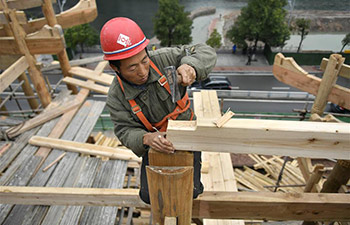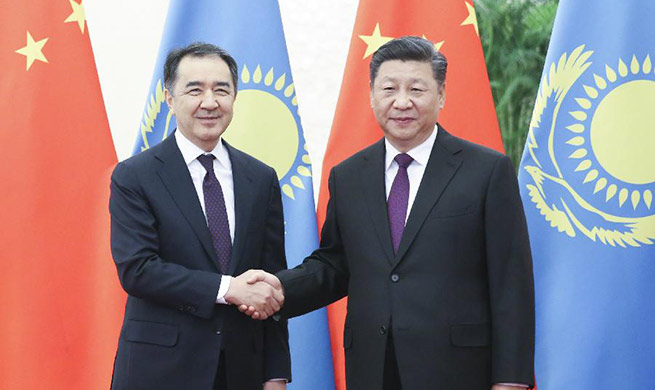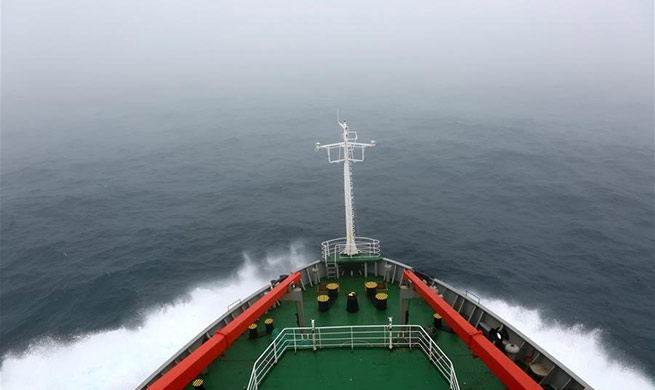by Alessandra Cardone
ROME, Nov. 22 (Xinhua) -- Experts at the 2018 European Forum on Disaster Risk Reduction urged on Thursday more financial resilience, prevention efforts, and an integrated approach to better address disasters at global level.
The Nov. 21-23 event, organized by the United Nations Office for Disaster Risk Reduction (UNISDR) in the Italian capital, has drawn ministers, civil protection directors, analysts, and private sector representatives from 55 countries in Europe, Central Asia and Caucasus.
Officially inaugurated on Thursday morning -- after a first day devoted to technical meetings -- the forum focused on the implementation of the Sendai Agreement 2015-2030, which was endorsed by the UN and provided a global framework for disaster risk management.
The key guideline in the Sendai Framework is to push for a gradual change of paradigm in the way countries and private stakeholders approach natural and man-made calamities, promoting a shift "from managing disasters to managing risks", the UNISDR explained.
"Climate change exposes our countries to phenomena of increasing severity, such as record temperatures, weeks of drought, and forest fires," UNISDR Head Mami Mizutori said in her inaugural address before the plenary session.
She recalled that Italy and Germany were amongst the top 10 countries in the world "to report significant losses from disasters."
Yet, only 13 percent of costs for disasters was currently invested in prevention at global level, and 70 percent in reconstruction efforts.
"It is therefore necessary to move from managing disaster to managing disaster risk," Mizutori stressed.
Acknowledging that Italy is a country vulnerable to "a large range of risks", Italian Prime Minister Giuseppe Conte said "This is why the government is particularly concerned with preventing disasters."
"We do this through an increasingly organic and integrated approach involving all levels of government, all organizations, and all local administrations," he said.
Italy's vulnerability was fully exposed by disasters occurred in the last two years, including four strong quakes in the central regions between August 2016 and January 2017, with 300 casualties, and the collapse of a major bridge in Genoa city in August, with 43 victims.
Deadly storms in the autumn killed over a dozen people, mainly due to flooding, prompting the government to declare a state of emergency in 11 of Italy's 20 regions.
"Prevention must be the defining feature of our policies of intervention: having this in mind, we have presented the National Security Plan for Hydrogeological Risk," the Italian prime minister added.
At the session on "Making the economic case for Disaster Risk Reduction (DRR) and sustainable financing", representatives from the private sector underscored the need for more financial resilience for both developing and developed countries.
"Resilience is the capacity to recover from a shock, and it is important at both micro and macro-economic level," explained Veronica Scotti, chairperson of Global Partnership Swiss RE.
According to her, in countries suffering from an unstable environment, at least two generations were often needed to fully recover from an emergency.
She noted that the distribution of "exposure" to disaster risk remained deeply uneven in European countries, where less than 10 percent of families were insured against seismic events, and less than 50 percent against flooding.
"Countries such as Switzerland, France, and Norway have an obligatory insurance system, and the UK has an annual insurance program in case of flooding, yet the more vulnerable members of the European Community are still exposed," Scotti said.
"We must move away from an economically unsustainable model for post-disaster management to one of pre-disaster management."
Idar Kreutzer, chief executive manager of Finance Norway, agreed over the useful role the financial sector could play in supporting the Sendai Framework.
"If we consider the serious impact of disaster on investments, the insurance sector can provide two contributions," he explained, namely to collect more and more data on disasters, which would help increase efficiency when it comes to boost community resilience, and to "give the risk a concrete price... so that we can invest in preventive measures."













